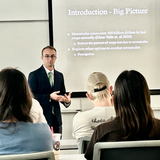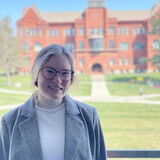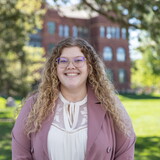When Felix Baumgartner set the world record for skydiving—jumping 25 miles above the earth's surface from a hot air balloon—he didn't just set a new standard, he inspired a Nebraska Wesleyan University student to follow suit.
Senior Joseph Roper isn’t skydiving but he has been adhering to the lesson Baumgartner unknowingly set in motion: seek out new experiences.
Skydiving takes more than the average abundance of courage; it requires a willingness to stretch comfort levels and venture into the unknown. Roper unearthed his willingness and stretched his boundaries by traveling across countries and oceans, exploring what he calls 'the great unknown'.
"There is a whole world out there that can provide you with a wealth of knowledge you didn't even know existed," he said.
For Roper, the great unknown began in Montreal, Canada where the biology and French double major spent his summer conducting research for McGill University.
Roper learned of the opportunity while attending a NWU biology lecture by alumna Koren Mann ('92), an associate professor of oncology at McGill University. During her visit, Mann mentioned possible opportunities for students to work in her lab during the summer.
"I had a summer student position open in my laboratory,” said Mann. “I normally take several summer students from around the world to open their eyes to the reality of laboratory research."
Soon Roper found himself in Montreal.
"I wanted to expand my knowledge by learning about a field of science that I had never heard of before, and it was totally worth it," said Roper. “ I got to experience working in a French city while working in a biology lab."
Roper's research at McGill University was no small feat. His objective was to help uncover the role of a special stress-inducing enzyme in cells that can lead to cancer mutations. The complete function of this enzyme—Arsenic-3-Methyl-transferase—is still unknown, but the research team that Roper assisted confirmed its relationship to cell growth. When this particular enzyme is removed from a cell, the growth rate for that cell decreases.
"I wanted to discover more about what biology is in a hands-on way," he said. "This experience taught me how to be more independent, how to ask questions, and how to function with differences, being in totally unfamiliar surroundings."
When his summer research concluded, Roper decided to dive deep again by studying abroad at l'Université de Savoie Mont Blanc in Chambéry, France. The town may be a stark contrast to Montreal, but both cities have given Roper equally pleasant experiences.
France has proven to be refreshing in its education and hospitality, Roper said. Students remain focused primarily on their area of study. While the general subject remains the same, the modes of learning change throughout the week, from big lectures to small discussions. Roper's classmates have showered him and fellow international students with abundant kindness. Strangers have demonstrated patience and a readiness to help as Roper navigated his new surrounding.
"These two experiences that I’ve had abroad, in Canada and France, have been leaps of faith," Roper said. "You need to be stretched and pulled to become a better person and to grow. What better way to do that than to get up and go?"
###
—Story by Quinn Hullett, public relations intern












